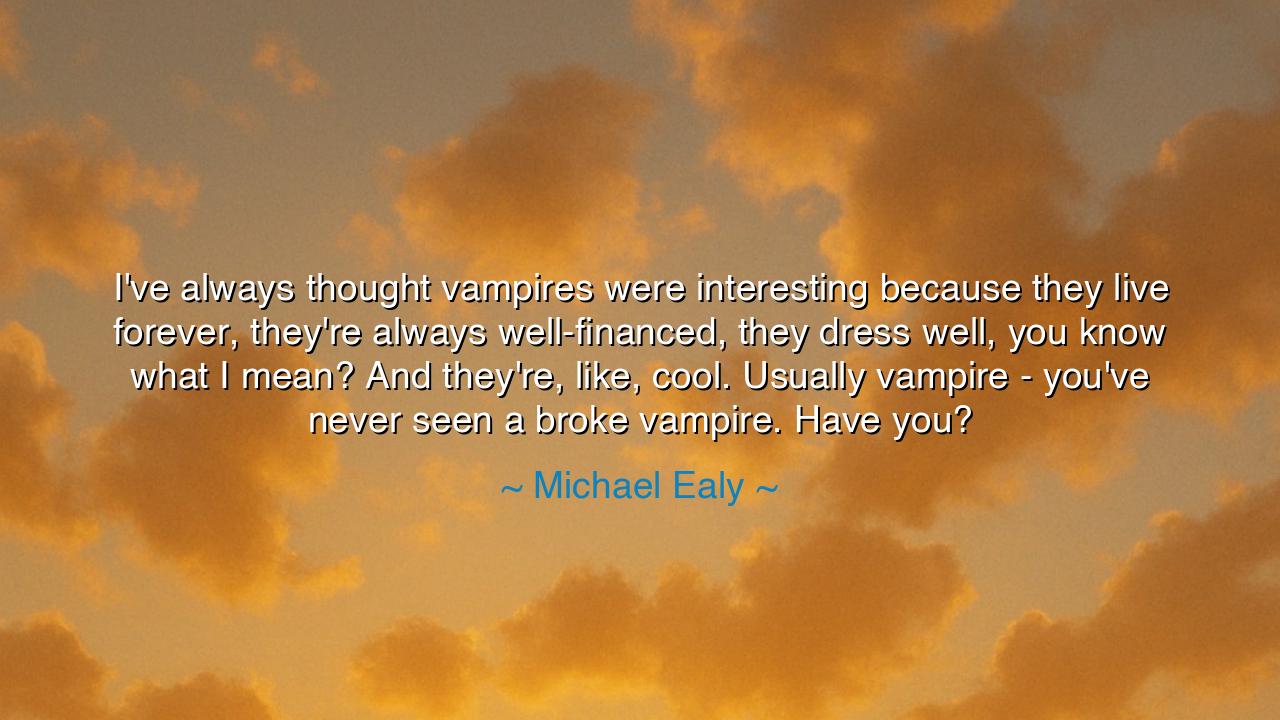
I've always thought vampires were interesting because they live
I've always thought vampires were interesting because they live forever, they're always well-financed, they dress well, you know what I mean? And they're, like, cool. Usually vampire - you've never seen a broke vampire. Have you?






The words of Michael Ealy—“I've always thought vampires were interesting because they live forever, they're always well-financed, they dress well, you know what I mean? And they're, like, cool. Usually vampire—you've never seen a broke vampire. Have you?”—may sound at first like a jest, a lighthearted observation about a creature of legend. Yet beneath this humor lies a meditation both ancient and profound, for what Ealy describes is not merely fascination with the supernatural, but a reflection of human desire—our yearning for power, immortality, and refinement. In the vampire, he sees not the monster of horror, but the mirror of aspiration: the being who masters time, conquers decay, and moves through eternity untouched by the frailty that binds mortals.
The vampire, in myth and story, has always been a symbol of paradox. To live forever, yet hunger endlessly; to be powerful, yet cursed; to be elegant, yet damned. In the eyes of the ancients, such a creature embodied the danger of desiring too much. Yet in Ealy’s words, there is admiration—perhaps even envy—for their composure, their wealth, their grace. He notes, almost with wonder, that one never encounters a poor vampire. Indeed, throughout literature, the vampire is never seen struggling in the dust; he is always surrounded by grandeur—silken garments, vast estates, and the quiet confidence of one who has conquered the chaos of ordinary life. Ealy’s humor reveals a truth: people, too, crave such control and coolness, the mastery that comes not from circumstance, but from an aura of power cultivated over time.
The origin of this quote comes from Ealy’s musings in interviews, where he reflected on his fascination with fictional immortals. Yet what he expresses transcends entertainment—it touches on the timeless human fascination with immortality and elegance. Since the dawn of civilization, mankind has sought to escape the ravages of time. The pharaohs built pyramids; the emperors of China sought elixirs of eternal life; the poets of Greece spoke of heroes ascending to the stars. The vampire, in modern myth, carries the same torch—it is the dream of immortality dressed in modern luxury, the fantasy of never having to decay or lose one’s place in the world. And Ealy, with humor and insight, recognizes that this fascination persists because it speaks to the heart of ambition: the wish to transcend.
Yet, as the ancients would remind us, immortality without purpose becomes a curse. The vampire, though “cool” and well-dressed, often lives in emptiness, repeating the same night for centuries, drinking deeply but never satisfied. In this, the myth warns us: wealth and beauty, though radiant, cannot fulfill the soul if meaning is absent. There are those in our world—rich, talented, adorned in elegance—who possess all that the vampire symbolizes, yet remain haunted by hunger. The lesson lies in balance: to cultivate grace, discipline, and strength as the vampire does, but to fill them with light, not darkness—with love, creation, and generosity, not vanity or greed.
History offers us examples of both paths. The Renaissance noble Lorenzo de’ Medici, called “The Magnificent,” mastered art, politics, and philosophy. He surrounded himself with beauty and brilliance—Michelangelo, Botticelli, and the greatest minds of his age. Yet unlike the cold vampire of legend, Lorenzo used his wealth to nurture life, not to drain it. In his refinement, he embodied what Ealy’s observation implies: that power and elegance need not corrupt, if guided by virtue. To be “cool” and “well-financed,” to live in mastery over one’s world, is not evil if it serves the good. The vampire, reimagined through wisdom, can be the disciplined human—immortal not in body, but in influence and spirit.
Ealy’s humor also conceals a deeper social reflection. When he says, “You’ve never seen a broke vampire, have you?”, he speaks to the way confidence, presentation, and self-respect can transform perception. Vampires, in fiction, hold power not because they shout, but because they carry themselves with poise. This, too, is a lesson for mortals: to cultivate dignity, to “dress well” not merely in cloth, but in attitude, in the way one speaks, listens, and moves through the world. The ancient Stoics taught this same truth: that the wise man, even if poor, walks with the bearing of a king, for his wealth lies in the mastery of self.
So, my child, take this teaching as you would a parable: admire the vampire not for his curse, but for his composure; not for his eternal life, but for his discipline; not for his power, but for his refinement. Seek not to live forever—but to live well, so that your deeds may echo across time. Be strong and graceful; cultivate skill and balance; and let your “coolness” be the calm of the soul, not the frost of pride.
Thus, remember the wisdom hidden within laughter: “They are dangerous, but it’s cool to have strong and powerful pets,” said Tracy Morgan—and likewise, Ealy’s vampires remind us that strength must be tempered by wisdom, elegance by humility, and immortality by meaning. The true measure of greatness is not to live forever, but to live so deeply that eternity itself remembers you.






AAdministratorAdministrator
Welcome, honored guests. Please leave a comment, we will respond soon